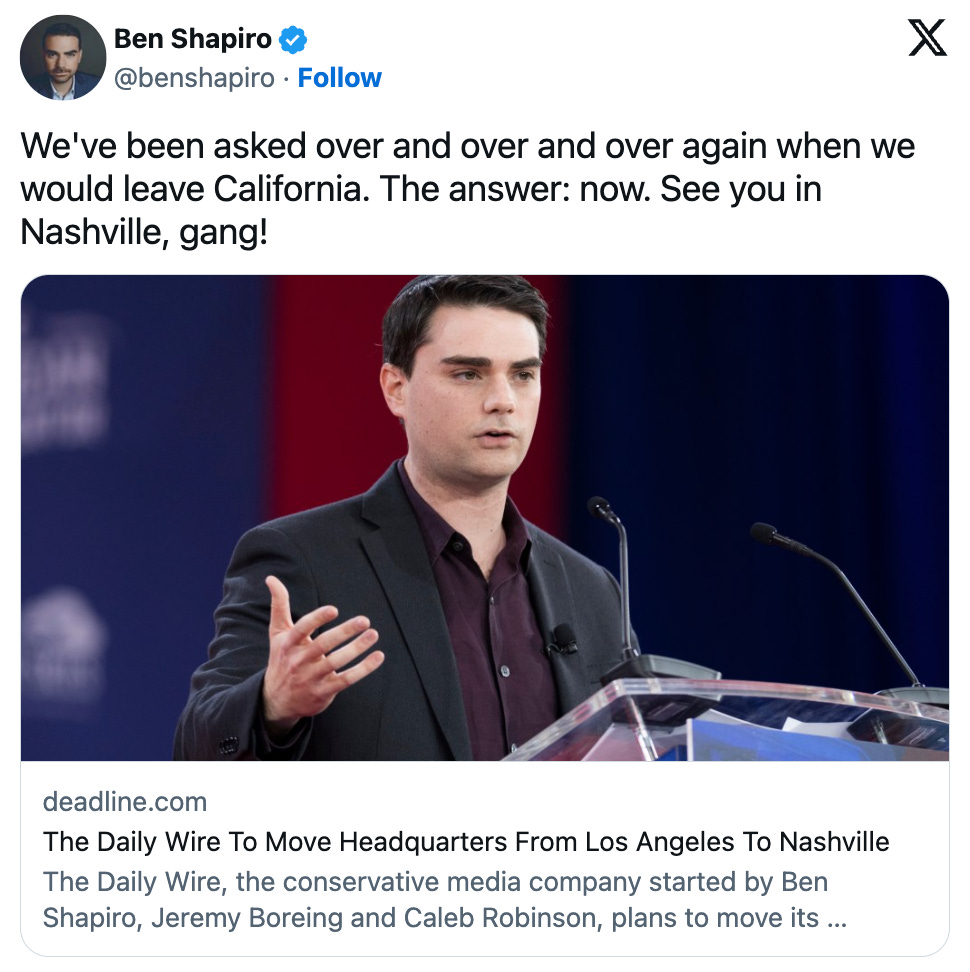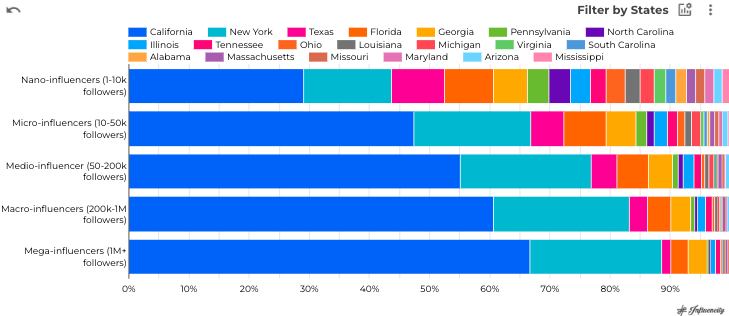No, family vloggers are not fleeing California over a child labor law
+ Garage Mahals, a $10 teen status symbol, Pope death pump, romance labor, the tyranny of the GlamBOT, and fascinating data about trends in Oscars speeches
To support my reporting, including deep dives into emerging online spaces, internet trends, and debunks of viral misinfo— and to keep this newsletter alive— become a paid subscriber today.
For the past few weeks, countless viral TikToks, YouTube videos, articles, and Reddit posts, have repeatedly claimed that family vloggers and parenting influencers are “fleeing” the state of California to avoid a new law that mandates a percentage of certain social media earnings go to their children.
The narrative has been pervasive, with content creators and their followers making parody videos about the alleged trend and thousands leaving comments lambasting the influencers. There’s just one problem: it’s not true.
There is absolutely no widespread trend of creators moving out of California in the wake of the law, and every industry expert I polled on this issue said that the opposite was happening. California remains a thriving hub for influencers of all types, including family influencers, and already has some of the strongest labor protections for children. Additionally, the law is likely not even enforceable on many family creators’ businesses given the way their revenue streams are structured.
In September, Gov. Gavin Newsom signed Senate Bill 764 into law, which requires creators who feature children in at least 30 percent of their content to set aside a percentage of earnings generated from ads on that content into a trust that the child can access when they turn 18. It sounds good on paper, but the law was written without the consultation of almost anyone who actually works in the business and is riddled with issues. It doesn’t even apply to the majority of revenue generated by many family influencer businesses, which often come from long term brand partnerships.
Additionally, as journalist Fortesa Latifi reports in Rolling Stone, the just three high profile family influencers who have left California, have done so for reasons completely unrelated to the law and announced their plans, in some cases, years before this law was even in discussion.
The LaBrant Family, with 12.8 million YouTube subscribers, announced their move to Tennessee two years ago in an Instagram post explaining that Tennessee was “where God is calling our family.” Sheri LaBrant, Cole LaBrant’s mother, told Rolling Stone that these TikTok conspiracies are baseless.
“Cole and Savannah moved for several reasons,” Sheri said, explaining that they needed to be closer to family and that Tennessee doesn’t have a state income tax. “Tennessee aligns more with their conservative values compared to California,” she said. She also added that the family had put money in a fund for their kids, regardless of any new law, for years.
Cecily Bauchmann, a creator who posts videos of her life as a mom of four, is also moving to Tennessee. A representative for Bauchmann told Rolling Stone that the new California law “did not influence” the family’s move to Tennessee whatsoever, and that the “focused on strengthening family ties and supporting her husband’s career.”
Brittany Xavier, a content creator who’s also a mother and has also been the target of this viral conspiracy, posted on TikTok that her family chose Tennessee because they wanted to live somewhere with a stronger community, slower pace of life, and “an amazing climate for farming” which Xavier wants in order to grow her own food, Rolling Stone reported. “The assumption that we moved to avoid paying our children is so laughable,” Xavier said in a video. “At the end of the day, people are always going to believe what they want.”
What the viral conspiracy theory about family influencers fleeing California completely ignores is how Tennessee has exploded in popularity among influencers over the past few years and become known as the “Conservative Hollywood.” A few right-leaning family influencers are a drop in the bucket compared to the much larger right-wing influencer exodus from California to Tennessee that has happened over the past few years.
Conservative influencer network and media company the Daily Wire relocated from Los Angeles to Nashville in 2020, along with their roster of conservative talent. Right wing influencers Robby Starbuck and Tomi Lahren, along with several other creators in their orbit also fled Los Angeles to Tennessee.
Conservative family influencers in other states that have zero child influencer laws on the books are also flocking to Tennessee, further refuting the idea that this is a California-specific phenomenon. Carlos and Alexa PenaVega, who have three children, for instance, recently left Hawaii to move to Nashville.
And despite conservative influencers leaving, the influencer industry in California is growing, not declining. In 2020, California led the United States in influencing with professional content creators comprising 5.45% of its population, according to Influencity, a digital marketing platform. Since their poll that number has only grown.
“California was the clear leader in terms of the total number of influencers,” Influencity found. The state is home to double the number of total content creators compared to runner-up, New York, and 66.72% of top creators reside in California. California also still remains home to all of the top influencer management companies, including those that represent and work with leading family vloggers and child influencers.
Conspiracy theories about influencers, particularly those who involve their families in content, take off because people online are eager villainize creators. The internet thrives on moral outrage, and influencers, especially family vloggers, are an easy target. There’s a deeply rooted belief that anyone making money online must be doing something unethical, or that content creators are “fame seeking narcissists.” Many of these tropes are deeply misogynistic and when it comes to influencers with children, these assumptions intensify.
People who irresponsibly spread these narratives often frame all parenting influencers as exploitative, abusive, or downright evil, not because they have actual evidence, but because it fits their pre-existing bias that influencing isn’t a real job and that success in this space is inherently undeserved.
Another thing that fuels these conspiracy theories is a fundamental misunderstanding of how influencers actually make money. Many of the loudest voices pushing these narratives have no grasp of online media businesses models in 2024. They assume that any influencer making money must be exploiting someone, especially their children, because they don’t understand how these people’s businesses work.
Are there bad actors out there? Sure, there are bad actors in every industry, but they’re overwhelmingly the minority.
TikTokers’ outrage at parenting influencers isn’t actually about protecting children or ethics in content creation, it’s about pushing a moral panic for clicks and views— ironically the exact thing that they criticize influencers for. These conspiracy theories take off because they reinforce the belief that influencers (especially women and mothers) are inherently evil and bad people.
This latest conspiracy about family vloggers is just another variation on a cycle that’s played out repeatedly over the years. People have been declaring the “death” of certain types of influencing for over a decade, always acting like it’s an unstable, unsustainable career that’s about to collapse any day now. The motivation behind this isn’t factual analysis, it’s schadenfreude.
There’s a certain type of person who loves seeing influencers fail because it validates their belief that traditional career paths are superior and that these women didn’t “deserve” the success they’ve achieved. When an influencer scandal happens, or when people claim a whole industry is crumbling, these critics jump at the chance to say, “See? I told you this wasn’t a real job.” They need influencers to fail because, deep down, they resent that these people found a way to make money outside of the system.
The reality is that influencing isn’t going anywhere. The industry has evolved, and yes, there are ethical concerns that should be discussed, especially around children in online content. But the viral conspiracy theories painting all family influencers as exploitative are not about protecting kids, they’re about pushing a moral panic for attention. These narratives don’t come from a place of knowledge, they come from resentment, ignorance, and the internet’s insatiable appetite for outrage.







